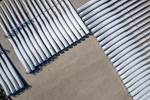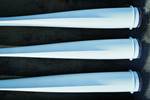DITF joins Horizon Europe REWIND project
End-of-life wind turbine recycling efforts are underway after the first REWIND consortium kick-off in May.
In May, the kick-off meeting for the “Efficient Decommissioning, Repurposing and Recycling to increase the Circularity of end-of-life Wind Energy Systems” (REWIND) project took place in Valencia, Spain. German Institutes of Textile and Fiber Research Denkendorf (DITF) is one of 14 partners from seven countries joining efforts to recycle composites waste in the wind energy sector.
REWIND deals with the recycling of wind turbine blades when they have reached the end of their service life. Project partners are developing basic technologies for properly dismantling the composite and methods for disassembly, quality inspection and evaluating the material to determine whether reuse or recycling is applicable based on its value.
This project will also highlight potential high-value applications for end-of-life (EOL) composites, such as repurposing for the construction and automotive industries. Recycling the most degraded parts will separate the matrix from the fiber. The recycled fibers, after subsequent sizing, spinning and weaving, along with new recycled resin from a solvolysis process monomer, will then be reused in wind, to manufacture a wind blade part and a repair kit as demonstrators.
At this first meeting, the research consortium discussed the objectives of the research project and the planning. The task of the DITF is to develop a yarn and a fabric for new components or for repair kits for wind turbines from the glass and carbon fibers recycled by the project partners.
Project coordinator Aimplas is developing catalyst pyrolysis and solvolysis methods to reduce processing temperatures and times. Aimplas is also in charge of repolymerization of recovered monomers from the organic fraction of solvolysis to obtain new recycled resins (epoxy, polyester and vitrimer resins).
Anticipated outcomes of this 4-year research project include improved overall lifetime, reliability, recyclability and sustainability of onshore and offshore wind turbines, potential new markets in wind turbine recycling and repurposing, enhanced overall sustainability of wind energy systems based on mainstream life cycle analysis (LCA) to address social, economic and environmental aspects and, lastly, a more efficient decommissioning and improved circularity of wind.
The project is funded by the Horizon Europe Framework Programme (HORIZON) of the European Union under grant agreement no. 101147226 and the European Climate, Infrastructure and Environment Executive Agency (CINEA).
Other partners include Techniker, IPC – Centre Technique Industriel de la Plasturgie et des Composites, Miljøskærm, Hochschule Pforzheim – Gestaltung, Technik, Wirtschaft und Recht, Alke Electric Vehicles, Suez Group, Bcircular, Composite Patch, TPI Composites Inc., R-Nanolab, CiaoTech-Gruppo PNO and Aemac.
Related Content
-
Plant tour: Albany Engineered Composites, Rochester, N.H., U.S.
Efficient, high-quality, well-controlled composites manufacturing at volume is the mantra for this 3D weaving specialist.
-
Sulapac introduces Sulapac Flow 1.7 to replace PLA, ABS and PP in FDM, FGF
Available as filament and granules for extrusion, new wood composite matches properties yet is compostable, eliminates microplastics and reduces carbon footprint.
-
Bio-based acrylonitrile for carbon fiber manufacture
The quest for a sustainable source of acrylonitrile for carbon fiber manufacture has made the leap from the lab to the market.

















